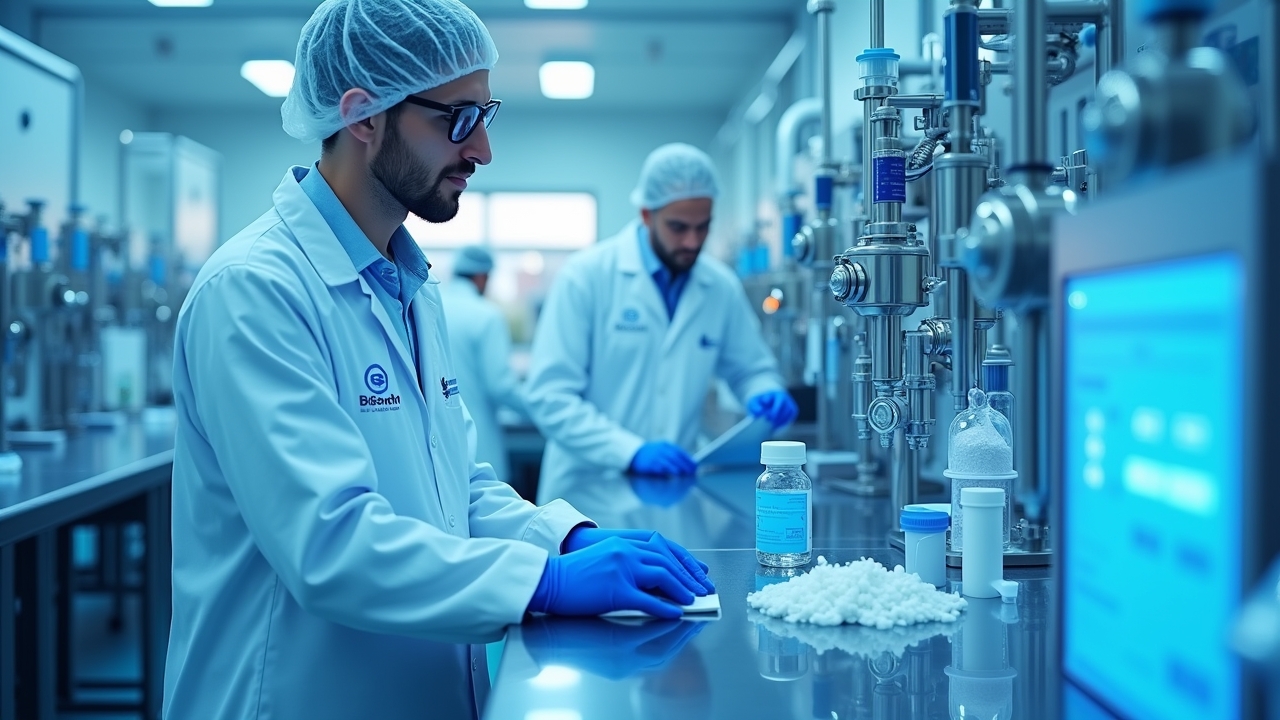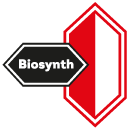
Kinase Inhibitor API Batch: From R&D to Global Distribution
Kinase Inhibitor API Batch: From R&D to Global Distribution
Kinase inhibitors have emerged as transformative therapeutic agents, especially in oncology, autoimmune disorders, and inflammatory diseases.
As precision medicines continue to gain clinical adoption worldwide, the demand for high-quality kinase inhibitor APIs has surged both from innovator companies and generic manufacturers.
Understanding the complete lifecycle of a kinase inhibitor API batch is critical for pharmaceutical buyers, researchers, and procurement managers aiming to partner with reliable API manufacturers in India and globally.
At Bio-Synth, we combine over 80 years of pharmaceutical engineering expertise with WHO-GMP certified manufacturing capabilities in Hyderabad to ensure our Active Pharmaceutical Ingredients, including kinase inhibitors, meet stringent international quality and regulatory standards.
This article outlines the end-to-end journey of a kinase inhibitor API, from early R&D to finished global shipment, offering powerful insights and practical guidance for supply chain decision-makers.
Kinase Inhibitors: Therapeutic Relevance and Market Trends
Kinases are essential cellular enzymes that regulate signal transduction pathways.
Dysregulation of kinase function has been implicated in various diseases, particularly cancers such as chronic myeloid leukemia (CML), non-small-cell lung carcinoma (NSCLC), and breast cancer.
Over 60 kinase inhibitors have been approved globally, and hundreds remain in pre-clinical or clinical development.
With the expiration of several blockbuster patents, the demand to buy APIs online, particularly kinase inhibitors, has increased significantly.
This market shift presents new opportunities for GMP-certified API exporters like Bio-Synth to support cost-effective, high-quality production of kinase inhibitor APIs worldwide.
API Lifecycle Overview: From Discovery to Distribution
A single API batch undergoes a rigorous multi-phase lifecycle that involves:
|
Phase |
Description |
|
R&D |
Synthetic route development, impurity profiling, and analytical method validation |
|
Pilot |
Lab-scale optimization and clinical quantity production |
|
Commercial |
Full-scale, batch-controlled GMP manufacturing |
|
QA/QC |
Stability testing, documentation, and regulatory filing readiness |
| Distribution |
Export logistics, cold-chain management, and client documentation |
Each of these steps must be executed with precision, documentation, and compliance to Good Manufacturing Practices (GMP), ISO 9001:2015 standards, and relevant pharmacopoeial monographs.
Stage 1: Drug Discovery & Process Development
Before an API can reach the market, chemists and process engineers must build an efficient, scalable, and cost-effective synthetic route.
Key Considerations in R&D:
- Developing selective synthetic pathways to yield high-purity APIs with minimal by-products
- Identifying critical process parameters (CPPs) and critical quality attributes (CQAs)
- Validation of eco-friendly analytical methods, including green RP-HPLC techniques to analyze raw materials and final products
At Bio-Synth, our process development labs maintain a robust knowledge base for drug classes like kinase inhibitors, antipsychotics, and anti-tuberculosis APIs.
By minimizing the use of hazardous solvents and optimizing yields, we deliver both sustainable and commercially viable API syntheses.
Stage 2: Pilot-Scale and Clinical Batch Production
The transition from laboratory samples to pilot-scale batches is crucial during early toxicity and clinical studies.
- Batch sizes in this phase typically range from 1–10 kg
- API is manufactured in controlled environments, verifying scalability and GMP applicability
- Product is tested for identity, strength, purity, and stability using validated green HPLC methods, microanalyses, and LC-MS techniques
- Impurities and degradation products are profiled extensively under ICH Q3A/B guidelines
This phase ensures the kinase inhibitor API meets the exacting standards required for Investigational New Drug (IND) submissions and bioequivalence studies.
Stage 3: Commercial Scale API Manufacturing
Once the API proves its safety and efficacy in Phase I–III trials, the focus shifts toward consistent, high-volume commercial production to meet global demand.
Why Bio-Synth Excels:
- Dedicated production blocks for APIs to prevent cross-contamination
- Fine control over reaction chemistries, including handling of hazardous raw materials and corrosive solvents
- Fully closed processing systems for moisture-sensitive or high-potency APIs
- CIP/SIP-enabled reactors, validated cleaning protocols, and inline monitoring tools to ensure batch-to-batch reproducibility
We’re one of India’s top bulk drug manufacturers with the capacity to scale from grams to metric tons, serving generic drug companies across Europe, Asia-Pacific, and Africa.
Stage 4: Quality Control, Regulatory Compliance & Stability Studies
Each batch of a kinase inhibitor API undergoes comprehensive release testing and documentation as per ICH Q7 and WHO-GMP protocols:
Quality Measures Include:
- Green RP-HPLC methods for assay and impurity quantification
- Forced degradation studies in oxidative, photolytic, acidic, and basic environments
- System suitability tests (SST) to confirm chromatographic performance
- Stability studies under Zone II–IV climatic conditions to assess API shelf life and support country-specific registrations
As an experienced export house and expert in TB drug APIs, Bio-Synth routinely submits Drug Master Files (DMFs) and Certificates of Suitability (CEPs) to international regulatory agencies.
Our technical dossiers are audit-ready and aligned with regional compliance frameworks.
Stage 5: Packaging, Labeling & Global Distribution
Delivering APIs from India to countries across continents involves meticulous planning not only in terms of packaging integrity but also documentation.
|
Component |
Details |
|
Packaging |
Triple-layer PE drums, vacuum-sealed containers, food-grade HM-HDPE carboys |
|
Labeling |
Batch number, manufacture/expiry dates, storage conditions, CoA reference |
| Transit |
Temperature-sensitive APIs are shipped in validated cold-chain logistics |
| Documentation Support |
CoA, MSDS, Stability Data, Impurity Profile, Audit Reports |
Our exports comply with both customs and health authority requirements in Europe, Middle East, Southeast Asia, and Africa.
Why Choose Bio-Synth as your API Manufacturing Partner
With a lineage dating back to 1943, Bio-Synth is more than an API producer; we’re your strategic manufacturing ally.
Why Pharma Buyers Trust Us:
- WHO-GMP certified site in Hyderabad, India
- Over 500+ MT annual capacity for APIs and intermediates
- Proven portfolio: TB, psychiatric, cardiology, anti-diabetics, anti-cancer APIs
- Robust documentation, technical support, and regulatory filing assistance
- Flexible batch sizes to support both R&D and commercial demand
- Excellent audit history with global pharmaceutical clients
Whether you’re sourcing kinase inhibitors, buying Bilastine API, or scaling a small molecule drug, we deliver reliability, consistency, and speed to market.
Take the Next Step
Looking for GMP-certified API exporters with global reach and expert regulatory compliance?
📞 Contact Bio-Synth today for custom quotes, commercial samples, or technical documentation for any of your API needs, including kinase inhibitors and other targeted therapeutics.
Position your pharma business for supply chain security and regulatory excellence. Partner with Bio-Synth, one of the premier API manufacturers in India, driven by science, backed by legacy.
Ready to Source Globally Compliant APIs?
Contact Bio-Synth today for custom quotes, regulatory documentation, or to initiate a DMF-backed supply relationship.
👉 Get in Touch With Our Technical Sales Team. (info@bio-synth.com)



Post a comment